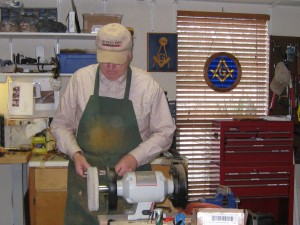
Meet another great Masonic artisan Jim McBeth, owner of McBeth Knives where you can buy a unique, one-of-a-kind, custom-made, fixed-blade knife with the Square & Compasses Masonic Emblem actually embedded in the handle. McBeth, a Past Master of Plano Lodge #768, Grand Lodge of Texas, moved from the greater Dallas area in 2008 to the Hill Country, near San Antonio, and then decided in 2012 to formally retire a second time from Real Estate (the first time was after 30 years with Texas Instruments in Dallas). His son-in-law and granddaughter are frequenters of gun and knife shows and on one occasion McBeth went along. After looking over all the knife exhibits his son-in-law asked him if he thought he could make knives as good as those he had seen at the show and he became convinced that he could.
McBeth did not want to build his own forge and stand over a hot furnace all day, so he scoured the nation for a supplier of knife blanks – essentially the naked blade. He insisted on top quality high grade steel. If he was going to produce a knife to sell, the first thing to avoid was those people that used junk steel. Obtaining top quality knife blanks is McBeth’s first step in the knife making process.
Most of the custom knives McBeth produces are fixed blade hunting and sportsman knives with full tang handles as opposed to hidden tangs. As a layman in this business of knife making I would describe the tang as the steel extension at the beginning of the blade to which the handle is attached. A handle for a knife with a hidden tang would be made from a block of wood (or stag horn or other piece of bone) of which the middle has been hollowed out and into when the tang slides. A full tang is one where two separate pieces of wood (known as ‘scales’) are attached to each side of the tang. They are attached by metal pins and McBeth makes his own mosaic pins. He describes the process thusly:
“Handles are secured to the knife with “pins”, so to further accentuate the knife I decided to create my own “pins” with “Mosaic” patterns to use when possible in my knives. The material I use for these pins include rods of Brass, Copper, Stainless Steel and Aluminum. I arrange the various sizes of these rods in patterns to create a ‘mosaic’ for each particular knife.”
McBeth also uses two different kinds of knife blanks – stainless steel and Damascus steel. I think we all know what stainless steel is all about but Damascus steel is another story.
Damascus steel is layered steel forming a pattern. Again McBeth fills us in:
“Damascus patterns include Ladder, Raindrop, Twist, Herringbone just to name a few. The “blanks” that I use are made from multiple bars of 1095 Carbon steel and multiple bars of high Nickel 15N20 steel creating between 175 and 250 layers in whatever pattern the “maker” decided.”
The next step in the knife making process is the handle which starts with the scales. The handle is the finished product. The scales are small pieces of wood from which the handle is fashioned. McBeth chooses to make his handles from scales of exotic woods because of the beauty and patterning in their grain. Some of these “Exotics” imported from various countries around the world, include Cocobolo Rosewood, Zebrawood, Canarywood, Red Heart, Bocote, Leopardwood, Bubinga, Wenge, Amboyna, Rosewood Burl, just to name a few. Two examples are pictured below.
Once the scales have been fitted to the handle with the chosen knife pins, McBeth must then fashion and shape them to the knife’s handle design. Then he must go through the long sanding process starting with 80 grit sandpaper and going up to 400 grit; and then finishing off with micro-mesh sanding using 1500 grit through 12,000 grit. Finally, the knife handle is ready for staining followed by sealing, polishing and waxing.
The Masonic emblem of choice is then embedded in the handle and the blade is oiled and in the case of Damascus steel, waxed.
This was the end of the process of making a custom knife until a few months ago. McBeth
started getting a demand for a sheath for his knives. After much searching and some trial and error he found a husband-wife team in Mississippi that hand make sheaths for knives. So most of his knives today are shipped with a companion sheath.
Recently McBeth has added a Masonic concho to his sheaths consisting of the Square & Compasses Masonic symbol. A concho is an ornamental metal (or other compound) disk often of Spanish or Native American Indian origin. McBeth found a supplier with a great looking “Texas” Masonic concho that adds to the Masonic flavor of the now fully dressed Masonic custom McBeth knife.
And that describes a premium product with a process that is truly outstanding. Everything
about a McBeth knife exudes high end quality. McBeth never settles for second best in all the processes that go into the finished product. He is not trying to make a $79.95 knife for Wal-Mart. When you buy a McBeth knife you may be equally happy in just displaying it as well as actually using it. McBeth believes that at the moment, no other knife-maker is providing Masons with a custom fixed-blade knife emblazoned with the Masonic symbol of the Square & Compasses.
It is easy to see why McBeth is so successful at whatever he turns his mind to. He has an inquisitive mind, a charming personality, a dogged determination and great pride and enthusiasm in what he sets out to accomplish. If McBeth doesn’t make millions, it won’t bother him. What he will take the most satisfaction from is on never cutting corners and always acting upon the level and parting upon the square.
Visit McBeth’s website at – McBeth Custom Masonic Knives


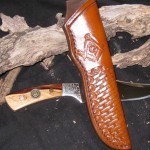
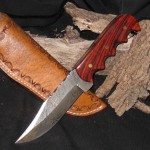
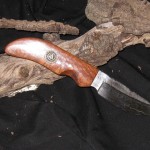

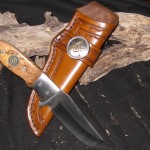
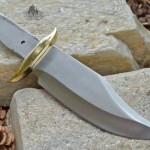
I am a Master Mason. I retired from the Army from Ft Campbell KY and am a Deputy Sheriff in the courthouse in Clarksville, TN. Working security, I ran into a soldier who was wearing a leather knife sheath with a silver US Army medallion. (Knives aren’t allowed in the courthouse) He said he got the knife from a friend in Texas, who was also a Mason, so when I did an internet search, I came across your website. I plan on retiring from the sheriff’s office soon and was looking for something special as a gift when I retire. I was wondering if he got the knife from you. The sheath was similar the your Texan model.
Fred